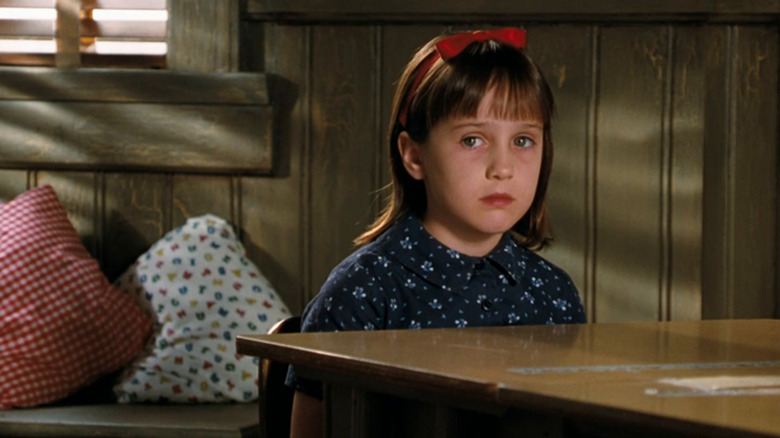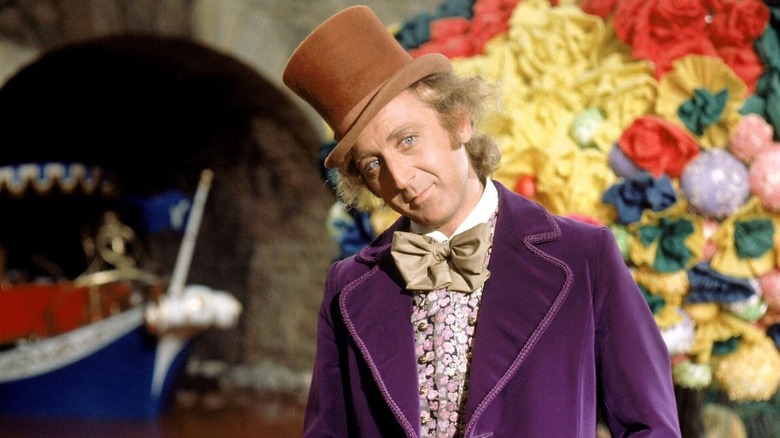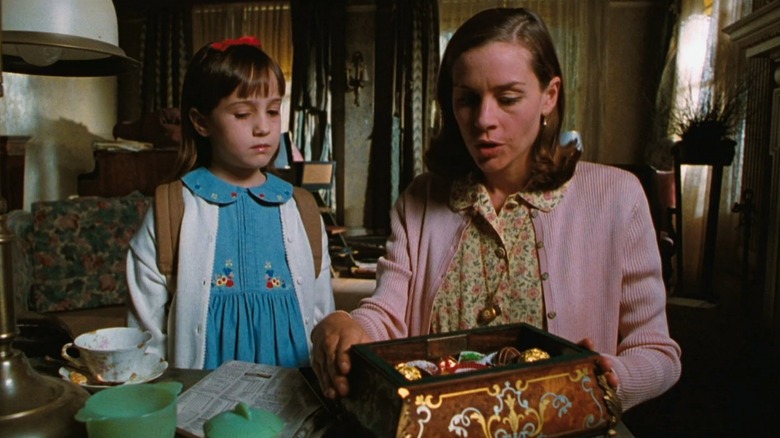Another Roald Dahl Classic Hits Netflix's Top 10 Ahead Of Henry Sugar's Arrival
Netflix typically refuses to release its actual viewership numbers to the public, making its weekly top-10 lists a fascinating peek into how streaming services actually operate. Netflix may pour millions into their original programs, but their ten most popular films or TV tend to (at least partly) be 25-year-old movies experiencing a seemingly random renaissance. Case in point: one of the hottest films on Netflix right now is Danny DeVito's 1996 family film "Matilda" based on the 1988 novel by Roald Dahl.
"Matilda," critically acclaimed upon its release, is about the titular young girl (Mara Wilson) who lives with caustic, greedy, tacky, and abusive parents (DeVito, Rhea Perlman). Her new school is a bleak, Dickensian nightmare overseen by the bestial, cruel Mrs. Trunchbull (Pam Ferris). The only person who treats Matilda with kindness is the put-upon Miss Honey (Embeth Davidtz) who sees how bright and gentle Matilda is.
Matilda sees little respite from her misery until she discovers one day, in a fit of rage, that she is able to move objects with her mind. Luckily, "Matilda" does not go the route of "Carrie," and her supernatural revenge against her miserable schoolmistress is far less bloody.
"Matilda" is, like Dahl's novel, a mixture of sweet and abrasive. Matilda is a wonderful hero for weird little kids who cherish being outside of the rotten systems they were previously trapped by. DeVito brings a wild, chaotic energy to the film, setting it apart from the staid British sensibilities of Dahl's novel.
Since his death in 1990, many filmmakers have taken a swing at adapting Dahl's novels. It's likely that many Netflix viewers are watching Dahl's other films prior to the release of Wes Anderson's short "The Wonderful Story of Henry Sugar," due on the streaming service on September 27.
Dahl's view
It's hard to say if Dahl himself would have liked "Matilda." It's a matter of record that Dahl loathed Mel Stuart's 1971 film "Willy Wonka & the Chocolate Factory," an adaptation of his 1964 novel "Charlie and the Chocolate Factory." According to the Daily Mail, Dahl allegedly felt that Stuart had no talent and that Gene Wilder, in the title role, was a terrible choice for Willy Wonka (he wanted Spike Milligan or Peter Sellers to play the part). Dahl also resented that his screenplay was drastically altered by the last-minute hiring of David Seltzer, who made the movie a lot cuddlier and friendly. Fans of Dahl will know of the author's misanthropy streak, and that warmth and joy are low on his list of priorities when writing a children's book.
His experiences with "Willy Wonka" made Dahl infamously tetchy about adaptations of his work. When Nicholas Roeg adapted his novel "The Witches" to film in 1990, he hated that the filmmakers wanted to give his story a happy ending. In the book, the young main character is transformed into a mouse and stays that way for the rest of his life. Roeg and executive producer Steven Spielberg wanted an ending wherein the boy turns back into a human. Roeg even filmed Dahl's version, an ending that he loved. At the last minute, however, Roeg switched back to a "happy" ending, leading to Dahl's outrage and threats of an attack ad campaign on the film.
There's a reason why adaptations of Dahl's most famous novels didn't come until after the author's death in 1990. After he passed, audiences saw big studio adaptations of "James and the Giant Peach," "Fantastic Mr. Fox," "The BFG," and a second film version of "Chocolate Factory."
And, of course, "Matilda."
Waltzing Matilda
Of the posthumous Dahl adaptations, "Matilda" falls somewhere in the middle. It's a sight better than Tim Burton's execrable "Charlie and the Chocolate Factory," but it lacks the quirk of Wes Anderson's "Fantastic Mr. Fox" or the wonderment of Steven Spielberg's "The BFG." Nonetheless, it has become intensely beloved, notably by people who were kids in 1996. Actress Mara Wilson has gone on record several times with her views of the film and many admire her efforts to expose the way Hollywood exploits its young talent. In 2016, Wilson wrote a book called "Where Am I Now?" which revealed many horrors in the American fame ecosystem. Wilson's essays and an aging cult of admirers eventually led to a 2010 stage adaptation of "Matilda." The musical debuted on Broadway in 2013 and would win five Tonys. The musical was also re-adapted for the screen in 2022 (directed by Matthew Warchus), and, after a very brief theatrical release, hit Netflix in December.
In 2023, "Matilda" has a passionate following, and one needn't look too far to find a fan ready to expound upon the film's virtues. From the looks of Netflix's numbers, more people are still discovering it. One can only hope that they also find Dahl's novels, several of his other movies, and Wilson's own writings on the topic of stardom, fame, and media exposure.
Meanwhile, Wes Anderson has completed his second film of 2023 (after "Asteroid City") and his second Dahl adaptation with the 39-minute "Henry Sugar," originally published as a short story in 1977. It's the first of four Dahl-based shorts Anderson helmed. The other three are "Poison," "The Swan," and "The Ratcatcher,"


